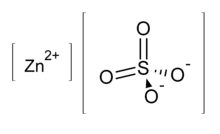Zinc sulfate (medical use)
Zinc sulfate is used medically as a dietary supplement.[1] Specifically it is used to treat zinc deficiency and to prevent the condition in those at high risk.[1] This includes use together with oral rehydration therapy for children who have diarrhea.[2] General use is not recommended.[1] It may be taken by mouth or by injection into a vein.[1]
 Chemical model | |
| Clinical data | |
|---|---|
| Pronunciation | zink SUL fate |
| Trade names | Solvazinc, Micro-Zn, others |
| AHFS/Drugs.com | Professional Drug Facts |
| License data |
|
| Routes of administration | By mouth, intravenous |
| Drug class | Trace element |
| ATC code | |
| Legal status | |
| Legal status |
|
| Identifiers | |
| |
| CAS Number | |
| PubChem CID | |
| DrugBank | |
| ChemSpider | |
| UNII | |
| ChEBI | |
| ChEMBL | |
| Chemical and physical data | |
| Formula | O4SZn |
| Molar mass | 161.47 g·mol−1 |
| 3D model (JSmol) | |
| |
| |
Side effects may include abdominal pain, vomiting, headache, and feeling tired.[2] While normal doses are deemed safe in pregnancy and breastfeeding, the safety of larger doses is unclear.[3] Greater care should be taken in those with kidney problems.[2] Zinc is an essential mineral in people as well as other animals.[4]
The medical use of zinc sulfate began as early as the 1600s.[5] It is on the World Health Organization's List of Essential Medicines.[6] Zinc sulfate is available as a generic medication and over the counter.[1][3]
Medical uses
The use of zinc sulfate supplements together with oral rehydration therapy decreases the number of bowel movements and the time until the diarrhea stops.[2] Its use in this situation is recommended by the World Health Organization.[2]
Zinc sulfate is also an important part of parenteral nutrition.[1]
References
- British national formulary : BNF 69 (69 ed.). British Medical Association. 2015. p. 700. ISBN 9780857111562.
- World Health Organization (2009). Stuart MC, Kouimtzi M, Hill SR (eds.). WHO Model Formulary 2008. World Health Organization. pp. 349–51. hdl:10665/44053. ISBN 9789241547659.
- "Zinc sulfate Use During Pregnancy". Drugs.com. 9 December 2019. Retrieved 8 June 2020.
- Council, National Research; Studies, Division on Earth and Life; Resources, Board on Agriculture and Natural; Animals, Committee on Minerals and Toxic Substances in Diets and Water for (2006). Mineral Tolerance of Animals: Second Revised Edition, 2005. National Academies Press. p. 420. ISBN 9780309096546. Archived from the original on 2017-01-16.
- Sneader, Walter (2005). Drug Discovery: A History. John Wiley & Sons. p. 62. ISBN 9780471899792. Archived from the original on 2017-01-16.
- World Health Organization (2019). World Health Organization model list of essential medicines: 21st list 2019. Geneva: World Health Organization. hdl:10665/325771. WHO/MVP/EMP/IAU/2019.06. License: CC BY-NC-SA 3.0 IGO.
External links
- "Zinc Sulfate". Drug Information Portal. U.S. National Library of Medicine.